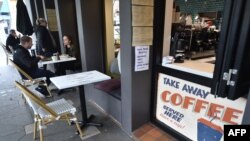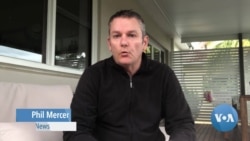COVID-19 has turned Australia into a fortress. Its international borders were closed to foreigners in March to stop the spread of the new coronavirus, and Australians can only leave with special permission from the government.
This is alien for a country of explorers. It is unnerving. Australians are inveterate travelers, and so am I.
A much-anticipated family vacation to see relatives and friends in Britain and Ireland was canceled. We don’t know when we will be able to go. No-one does. It might be next year, or the year after. Even a trip to see my father who lives across the Tasman Sea in New Zealand isn’t possible, just yet.
There are sound public health reasons for a country to shut itself off from the rest of the world during a pandemic, but the social and economic consequences are huge.
Australia is one of the most multicultural places on Earth. More than a quarter of us were born overseas, and our family ties stretch to every corner of the world.
We visit them, and they come to us, but not anymore. A plane in the sky over Sydney these days is something of a rarity. Very few people are flying, and aircraft are grounded.
Even within Australia - the sixth biggest country on Earth - travel is restricted. Internal borders have been closed to stop the advance of the virus. Other states and territories look with suspicion at New South Wales and Victoria - the two most populous jurisdictions, which have the most COVID-19 cases.
Now that imported cases of the coronavirus have largely been contained, the great fear is community transmission. This is the age of the disunited states (and two mainland territories) of Australia.
Lockdown restrictions within state borders are gradually being relaxed in a bid to resuscitate an ailing economy. Places of worship are allowed to reopen, and Australia’s religious devotion to coffee is finally unshackled: Cafes and restaurants have reopened, though they are limited to no more than 10 patrons, or less than a soccer team, at one time.
Who would have thought the simple pleasure of a breakfast with a couple of friends in a beachside cafe on a sunny autumn morning would seem like such a treat? But there we were, reclaiming a lost freedom. Mind you, we had to line up outside for almost an hour for that creamy taste of liberty.
Our children will soon return to school after weeks of home learning. Libraries and art galleries will open their doors again, and larger gatherings at home and elsewhere are now permitted.
It feels as if we have passed through the eye of the COVID-19 storm in far better shape than many other countries. Mass testing, strict lockdowns and closed borders have been key, but if we are on the path back to normality, what will our everyday lives look like in the near future?
We’ll have to do without handshakes, packed commuter buses and crowded beaches. Perhaps laws will be passed to mandate social distancing. Australians are mostly compliant at times of national distress.
This is a land well used to nature’s extremes. For most of us, the summer’s bushfires seem a distant memory. Those long, sometimes dangerous days working in the fire zone have been replaced by covering the fight against an invisible enemy.
During the ‘Black Summer’ fires, places like Sydney were often blanketed in smoke that had been carried by the wind from nearby blazes. Now we have been smothered by the fear of a highly infectious disease that will continue to change the way we live.
For those of us with family and close friends in other parts of the world, there is that gnawing concern for them at a time when this killer disease continues unchecked. As a journalist, every story I write reminds me of our fragility in the face of a wretched virus that is, for now, unstoppable.
To protect ourselves, we live in a bubble. When we are with our friends, we are still apart, by the required 1.5 meters. Some have lost jobs, but thankfully no one in my circle has lost a loved one to COVID-19.
Australia has been lucky to avoid the mass casualties seen in Europe and the United States. I can see complacency creeping in, but this is the age of vigilance -- at least until an effective treatment or a vaccine is found. Australia will likely remain a fortress for quite some time.






